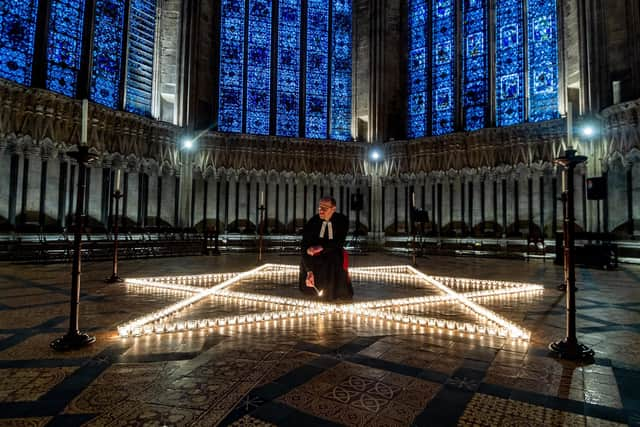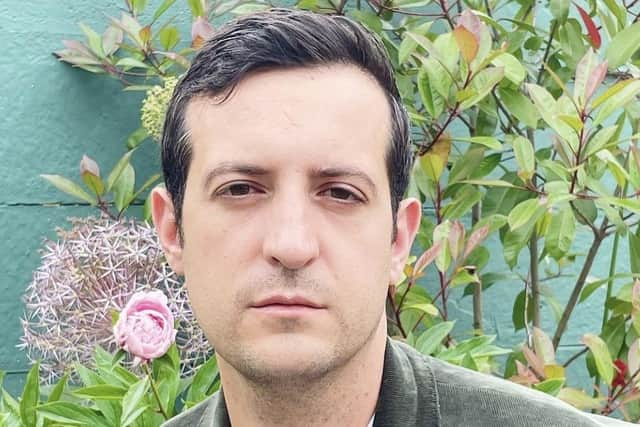Remembering the victims of the Holocaust can help avoid a repeat of the past - Alessandro Bucci
The oft quoted aphorism that ‘those who cannot remember the past are condemned to repeat it’ reminds us that we ignore history at our peril.
We are losing the last generation of Holocaust survivors and surveys repeatedly show that adults and younger generations do not know of Hitler’s industrial scale extermination that killed six million Jews (and five million Roma, LGBTQ, Slavic and disabled people) during the Second World War.
Advertisement
Hide AdAdvertisement
Hide AdAdd to this the fact that Holocaust history is under attack from denial, distortion and conspiracy theories on social media and there is a very real danger that an event that challenged the foundations of history is gradually being wiped from memory.


And yet at a time when the terrible truth of the Holocaust is slipping into the fog of time, the evils of genocide, ethnic cleansing, racism and antisemitism are still widespread. The Holocaust is not ancient history that can be dismissed as having no connection to the modern world, but a constant reminder of the depths of man’s inhumanity and his infinite capacity for evil.
You don’t have to look far to see the universal meaning of the Holocaust manifest itself in contemporary crimes. You can see it in the Russian media’s call for a ‘final solution’ in Ukraine. Or in the acts of genocide committed against the Rohingya people by the Myanmar military junta. Or the increase in antisemitism, xenophobia and far-right extremism across Europe.
“It could happen again,” Martin Kapel, the 92-year-old Holocaust survivor who lives in Leeds recently told me. “I’ve seen how it starts with leaders like Putin and humans can do terrible things unless people work together to stop them.”
Advertisement
Hide AdAdvertisement
Hide AdI share these sentiments and this year’s theme of ‘ordinary people’ to mark Holocaust Memorial Day 2023 strikes at the heart of the fears outlined by Martin. It reminds us that genocide is facilitated by ordinary people. They turn a blind eye, believe propaganda and join murderous regimes.


But this theme also urges us to think about how those who are persecuted are similarly ordinary people. In this it points to the moral connectedness of all people.
But if ordinary people let genocide happen by being bystanders and ignoring what was going on, it is extraordinary people who stand up and make brave decisions to rescue those who are persecuted. And all of us have the capacity to do extraordinary things. We can all play a bigger part in challenging prejudice and working together to stop it laying roots in our communities.
This is a key part of our work and our learning programmes for schools aim to build greater empathy and foster a culture of care when talking about difficult and traumatic histories. Natural empathy is the greatest bulwark against prejudice and persecution, and it’s something we don’t always see enough of – particularly towards those who are displaced by conflict.
Advertisement
Hide AdAdvertisement
Hide AdThe world is currently facing the highest number of violent conflicts since the Second World War and this is creating a refugee crisis. Millions have had to flee their homes because of bombing, invading armies or gang violence and there are now more displaced people than at any time in modern history.
We often see this depicted in imagery showing groups huddled together on a dinghy trying to reach a place of safety. In this respect, refugees have always been ‘othered’ as a homogenous threat rather than ordinary people with individual tales.
At Holocaust Centre North, we make it our mission to challenge stereotypes and show the human face of war and displacement. That’s why we put individual stories of Holocaust survivors at the heart of everything we do. It’s why we were founded by survivors who wanted to raise awareness, bear witness to the truth and show solidarity with survivors. We tell a global history through local stories.
Every week we see how these stories cut through to school children across Yorkshire. Many are shocked to be told that they could bump into Holocaust survivors in Asda and the realisation that history crosses over into their daily lives is powerful.
Advertisement
Hide AdAdvertisement
Hide AdAnd that’s how we should view the history of the Holocaust; not as a burden but as something that lights the way to a better future.
So this year, let us not just remember the victims of genocides and make promises never to forget, but redouble our efforts to stop this tragedy happening again by committing to challenge prejudice wherever we see it.
Alessandro Bucci is the director of Holocaust Centre North.